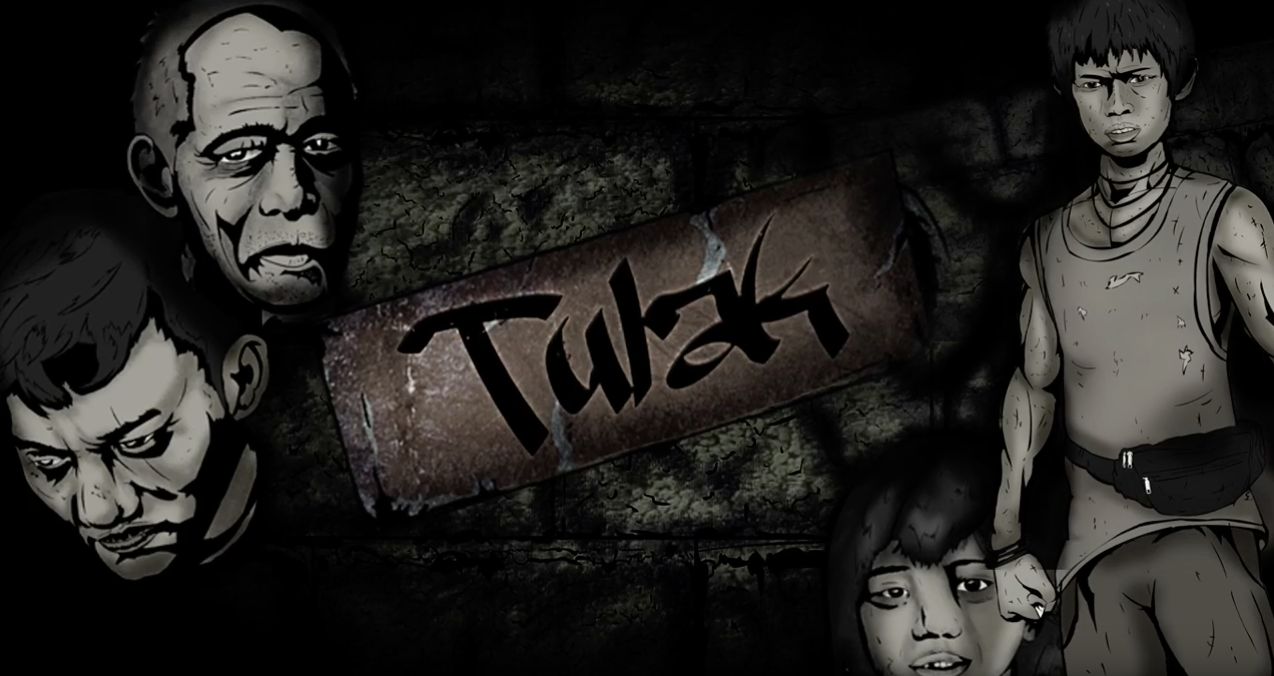TULAK is a choice-based indie game that began as a thesis project by a team of De La Salle-College of Saint Benilde (DLS-CSB) alumni. Team JRMS, as they are known, consists of Jhay Ulilang (game/sound designer), Ralph Miraflor (programmer), Migz Hermanos (programmer), and Steven Cadena (game artist), all of whom were products of Benilde’s Game Design and Development program.
In an interview with The Benildean, Cadena said “The initial concept was something more “game-y” in a sense that it involves the main character escaping through an abandoned warehouse. […] Another was more of a straight fetch quest like, where the drug selling is more of a mechanic as opposed to the dialogue system. Through it all though, what remained is the core theme of the feeling of a teenager who grew up in an environment wherein he wouldn’t feel so helpless but still is caught in a dire situation.”
The game revolves around Jed, whose chances of a clean means of sustaining himself and his sister were blocked by the Department of Social Welfare and Development because of laws against child labor. Given no other choice, Jed becomes a teenage drug pusher, with his age protecting him from the authorities. But when the war on drugs takes over the streets of Manila, Jed fears for his life and wants out.
Cadena said this storyline was inspired by many factors. “I was watching a documentary about a specific squatters’ area in Manila. Something which also reflected the place I grew up [in] and was [exposed to] at that time. I lived near a tenement just behind our then house, and my grandfather took me inside it a lot. Not only that but I was familiar with the whole street drug environment as, growing up I saw a lot of transactions [happening] when going home.”
Despite being a hot topic, Cadena and his team also noticed that there weren’t any games in existence that tackled the issue—a fact that further pushed them to create TULAK. The story tat this game presents is rooted in the truth, based on the narratives that surface as a result of the ongoing war on drugs.
The social commentary presented is not only seen within the storyline, however, with stark visuals similar to the style of the popular Trese comics; both depicting the shadows and grit of Manila and the people within it.
On the game’s reception, Cadena said the audience’s response to the game was more positive than mixed.
“We were actually surprised by the amount of “love” it got from people who while are within our target audience, isn’t exactly in the gaming crowd. The game got a lot of support from people from the creatives and academics. There [were some] rather misinformed comments from those who saw the premise of the game but didn’t bother to try it out, and iIn some cases used] our game for their political agenda,” he said.
Meanwhile, TULAK bagged awards for Best Game for Many, Best Game Art, and Best Narrative of Story at Animahenasyon 12: Philippine Animation Festival last November 2018, which is held to recognize and celebrate both aspiring and professional animators in the country.
As for future plans for the game, JRMS sees a great potential in expanding both the story and universe of TULAK.
“Since we made the endings a bit ambiguous to say the least as we saw potential in expanding the story and the universe of Tulak, that if given the chance we could make an episode 2 of the game. We are working on and off on a mobile version of the game. Another requested feature is the option to choose an English dialogue. We have also been approached by others regarding interest in helping us with the game and we are taking things into consideration,” Cadena said.
Currently, TULAK can be downloaded at https://stevencible.itch.io/tulak for free, or at a pay-as-you-can basis, which would greatly help the team in further developing TULAK.


